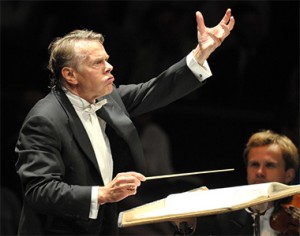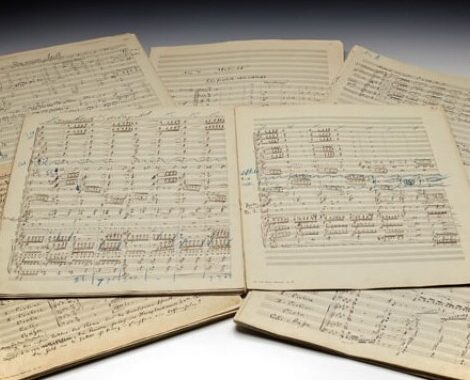Prom 35: Bavarian Radio Symphony Orchestra & Choruses, Jansons, Royal Albert Hall (Review)
 Mariss Jansons by no means gave us the whole story of Mahler’s Second Symphony “Resurrection” at his second Prom with the Bavarian Radio Symphony Orchestra. Like Berlioz’ Symphonie fantastique from the night before it was a work which pushed the symphonic envelope at the end of the 19th century and shocked everyone with its uncompromising newness. It can and should still do so – and all that is required (as Vladimir Jurowski so dramatically demonstrated a couple of years back) is to follow Mahler to the letter of his score but more importantly to repeatedly ask why these particular notes are presented in the way that they are. The biggest issue I had with this Jansons performance was with how “comfortable” it sounded – a marvelous orchestra playing very much within itself, a sound blended to perfection, but so relatively few moments of scalp-tingling excitement – and danger.
Mariss Jansons by no means gave us the whole story of Mahler’s Second Symphony “Resurrection” at his second Prom with the Bavarian Radio Symphony Orchestra. Like Berlioz’ Symphonie fantastique from the night before it was a work which pushed the symphonic envelope at the end of the 19th century and shocked everyone with its uncompromising newness. It can and should still do so – and all that is required (as Vladimir Jurowski so dramatically demonstrated a couple of years back) is to follow Mahler to the letter of his score but more importantly to repeatedly ask why these particular notes are presented in the way that they are. The biggest issue I had with this Jansons performance was with how “comfortable” it sounded – a marvelous orchestra playing very much within itself, a sound blended to perfection, but so relatively few moments of scalp-tingling excitement – and danger.
Much of that is achieved through extremes – of tempo, of articulation, of dynamics. Whilst Jansons was superficially faithful to Mahler’s very precisely annotated score and conducted it “by the book” he didn’t seem to be asking why often enough. If you beat out the opening bars as strictly as Mahler intended the suspenseful tremolando at the outset (echoes of the Die Walküre storm prelude) maintains its suspense through those scarifying upheavals from cellos and basses. The temptation is to contract the space between them by moving the music forward. Mahler doesn’t ask the conductor to do so, so he/she needs to be asking why.
Jansons’ first movement was built on such compromises. I am curious why a conductor and orchestra who stretch to the most ear-pricking pianissimi – the breathtaking moment of stasis before string basses recommence the march roughly halfway through was a case in point – are reluctant to break through the good taste barrier and take the cover off the brass in Mahler’s very selective triple-fortes. Jansons scrupulously observed the accelerating dash to the abyss in the great climax of the development but the precipitous plunge to molto peasante went for absolutely nothing and the hideous dissonance of that battering ram chordal sequence was so blunted as to be barely apparent at all.
Beauty was never in short supply. We basked in the shy rapture of the second subject and its rosy transformation in the recapitulation festooned in portamento – the string playing was glorious. But how much more it means if the corresponding “shock and awe” is deeply, uncompromisingly, raw and unsettling. Does the Bavarian Radio Symphony Orchestra ever make an ugly sound? Even the E-flat clarinet – the orchestra’s loudest voice, decibel-wise – was less the hooligan more the genial clown in the sinister third movement, though again the nostalgic close-harmony trumpets of the trio were transportingly dreamy.
As always the Royal Albert Hall came into its own in the finale. While the still, maternal, voice of the mezzo – the excellent Gerhild Romberger – prepared us for the journey to come and Judgement Day beckoned, the hall’s embarrassment of open space was wonderfully stage managed as horns and trumpets and drums sounded from its four corners. The nightmarish offstage band (remember when it simply wasn’t there in the Abbado performance a few years back?) even appeared to get closer (as Mahler directs) and there were stratosphere-piercing top notes from the Bavarian first trumpet and a super-trenchant march for the undead from the strings. Suddenly things came alive.
The hushed choral entry (the combined Bavarian Radio Chorus and WDR Radio Choir Cologne with its solo soprano corona – Genia Kühmeier) was, as it always is, heartstopping and the slow ascension to the peroration radiant. Of course, we had to forego the mighty RAH organ for a feeble electric job on account of pitch differences and that was quite a drawback in the closing pages.
I kept thinking of Mahler experiencing the piece in this hall with this audience but equally I kept wondering how he might have reacted to how safe it all sounded under Jansons. Impressive? Yes, in parts. Overwhelming? Never.
Mariss Jansons conducts the Bavarian Radio Symphony Orchestra at the BBC Proms.
Credit/Copyright: BBC/Chris Christodoulou
You May Also Like

GRAMOPHONE: From Where I Sit – June 2022
21/06/2022
GRAMOPHONE Review: Falsettos – 2016 Broadway Cast Recording/Finn
24/04/2018
2 Comments
Brian Easter
I like you was very disappointed with Mariss Jansons’ performance of Mahler 2. It just sounded too comfortable and I wonder whether he is becoming “intoxicated” with the wonderful sounds he can get from his two top-class orchestras in the same way as Sir Simon Rattle is with his Berlin Philharmonic and as Karajan was before him with that orchestra. I see David Nice agrees with many of your thoughts about the performance.
Mariss Jansons 20 years ago was a more exciting conductor than the 70-year-old we see these days. I note that in your reviews of Jansons’ recordings of Stravinsky’s Rite of Spring and the new Shostakovich 10 you find the sound beautiful and the interpretations just too plush and “comfortable” with no sense of risks being taken.
I will say that hearing the repeat broadcast of Janson’s Mahler 2 this afternoon was better than hearing it in the hall on Friday where I was in the Arena near where the stairs from door 3 meet the Arena, in particular the off-stage brass and percussion sounded more distant, and the sound overall was better balanced.
Certainly for Mahler 2 I find his protégé Andris Nelsons has produced a more exciting performance and got fantastic playing from the CBSO, but that was in Symphony Hall!
Helga
There are certain works – Rite of Spring, Beethoven 9, Mahler 2, where just getting the right notes,however beautifully is never good enough.
How different this same symphony sounds with the Bavarian RSO under Klemperer in 1965!